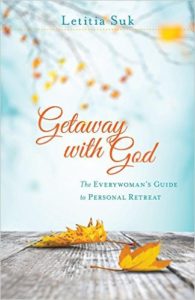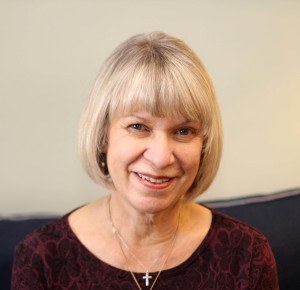Note: In this feature, writer Whitney Hopler profiles women who write about faith. If you are the author of a new book (published within the past six months) and would like to be considered for an interview, please email Melanie.
By Whitney Hopler
Attracted by the idea of taking a spiritual retreat, but wondering if doing so is really worth it? Author Letitia Suk shows why spiritual retreats are valuable investments in her book Getaway with God: The  Everywoman’s Guide to Personal Retreat (Kregel Publications, 2016). Throughout the book, Suk writes like a warm and wise friend, motivating and guiding busy women through the process of planning retreats to grow closer to God.
Everywoman’s Guide to Personal Retreat (Kregel Publications, 2016). Throughout the book, Suk writes like a warm and wise friend, motivating and guiding busy women through the process of planning retreats to grow closer to God.
Suk, who is also author of the book Rhythms of Renewal, has helped many women learn about the benefits of retreating with God. She knows what it’s like to live a busy life herself, working as a life coach, writer, speaker, and hospital chaplain while investing in relationships with friends and family. The mother of four grown children and a wise communicator to readers and audiences, Suk has solid experience creating a purposeful life. She helps women learn how to reach their God-given potential by living intentionally through her blog at www.hopeforthebest.org.
Sometimes people resist taking retreats because they worry that the time off is somehow too indulgent or too carefree. But as Suk points out, investing in retreats is actually a responsible choice to make, because it plugs people into God’s power to recharge them. “Every time I have taken a retreat (and there have been at least 60), a day or two before, I’m convinced I can’t possibly get away. Just too much to do,” Suk says. “I’ve learned to recognize this as the very impetus to carry on as I am clearly already on overload. Any time I leave my home for something life-giving, even if it is just a walk around the block, it clears my head and renews my perspective. A retreat provides the opportunity to clear out mental clutter and reorder thoughts which almost always results in more meaningful productivity. As for cost, I consider it an ‘investment’ rather than ‘expense.’ The payouts are high!”
During her own retreats, Suk has experienced many memorable moments with God. For example, “Walking the beach and looking back on my first 60 years was one of the most profound and transformative experiences of my life,” she recalls. “To see the long-range vision through God’s eyes provided a clarity and direction that has shaped my life since.”
 Getaway with God describes a variety of different types of spiritual retreats – from restorative retreats to goal-setting retreats – and their purposes. Each type of retreat also can feature a variety of options for spiritual practices, such as observing silence or fasting. Approaching a retreat with a plan is wise, says Suk. “I think having a specific plan gets you out the door. Otherwise it can just be too open-ended and daunting.”
Getaway with God describes a variety of different types of spiritual retreats – from restorative retreats to goal-setting retreats – and their purposes. Each type of retreat also can feature a variety of options for spiritual practices, such as observing silence or fasting. Approaching a retreat with a plan is wise, says Suk. “I think having a specific plan gets you out the door. Otherwise it can just be too open-ended and daunting.”
Intentionally focusing on growing closer to God on a retreat helps people notice God’s presence with them. Paying attention is the key, Suk writes. Women who are used to busy schedules full of activities may be surprised that they don’t need to be doing something for God to encounter him in a profound way. During every encounter with God, something significant will happen – even by doing nothing more than simply enjoying God’s company.
Suk explains, “A retreat starts with a choice to set aside a chunk of time to be present with God instead of trying to work Jesus into an already packed day. Once the time is waiting, it is a matter of stepping into it with expectation that something will happen even if you’re not sure what. I call my small group personal retreats ‘Slow Dance with Jesus’ because it feels like that: Intimate, inviting and up close. If you are in any significant relationship you set aside time for it and the more time the deeper the relationship goes. A retreat has the same results.”
The closer someone’s relationship is with God, the better she can hear God’s messages. It also helps to let go of the expectation that God will speak in a dramatic way during a retreat. Usually, God speaks quietly, in order to encourage people to move closer to him so they can hear.
After a retreat, when people return to their daily routines, it’s important for them to follow through without procrastinating on whatever guidance God gave during the retreat. Suk says it’s vital to follow through right away because, “Our hearts are tender after a retreat and our resolve is high. As the days go on, what we felt so sure of might begin to fuzz out. We seem to have special grace for follow through in the immediate days, but if we don’t respond, it might be harder later.”
One way readers can incorporate the principles of retreats into their lives on a regular basis is by observing weekly Sabbath days. Suk includes a chapter on the benefits of the Sabbath, which she says “is a rest for our souls like sleep is for the body.”
While Getaway with God beautifully describes the blessings that can result from taking retreats, the only way to fully discover those blessings is to actually take a retreat. “Don’t wait until you have it all figured out,” Suk urges. “Schedule a retreat and see what happens!”
Whitney Hopler has written extensively about faith for Crosswalk.com, About.com, and other places. She wrote the young adult novel Dream Factory, which is set during Hollywood’s golden age. Whitney blogs about body, mind, and spirit wellness.
other places. She wrote the young adult novel Dream Factory, which is set during Hollywood’s golden age. Whitney blogs about body, mind, and spirit wellness.